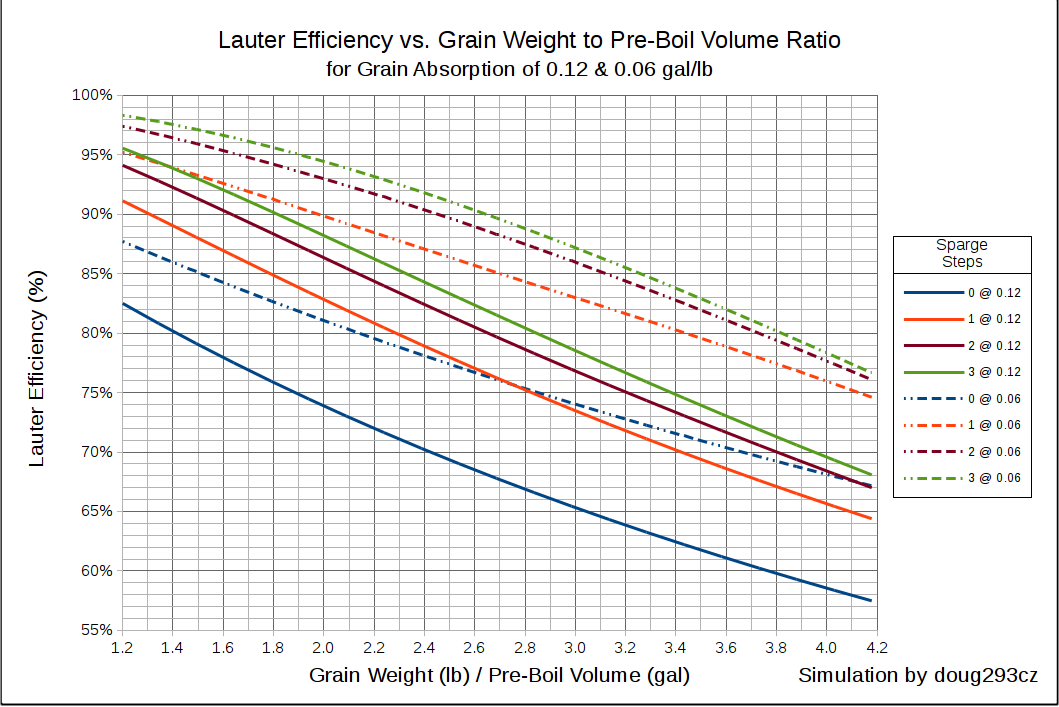gifty74
Well-Known Member
No. Guess need to do this next time. Ugh. I can easily do that, just didn’t.Did you monitor the SG of the wort during your mash, as recommended in post #12 above? If so, what were the times and SGs measured?
Brew on

No. Guess need to do this next time. Ugh. I can easily do that, just didn’t.Did you monitor the SG of the wort during your mash, as recommended in post #12 above? If so, what were the times and SGs measured?
Brew on
Which is why throwing more and more grain at your problem is only making it worse.Efficiency is always crappy with high gravity beers, unless you: (1) sparge a LOT extra AND (2) plan to boil for a good 2-3 hours. You need to collect all the sugars in the huge 20+ pound grist if you want them to show up in the finished wort.
This would be my choice. Boiling for hours on end is wasteful of energy in an already energy-hungry hobby.OR, (3) plan to partigyle making a smaller batch with the first runnings and a smaller beer with the second runnings, or similar.
Could you explain?Which is why throwing more and more grain at your problem is only making it worse.
As noted, bigger grain bills entail greater losses, and it seems like OP keeps trying to make up for those losses by making the grain bill ever bigger. Maybe I'm off base here, but I'd be interested to see what kind of efficiency he'd get with a smaller beer and a thinner mash.Could you explain?
Once you understand the chart below, it explains it all.Could you explain?






![Craft A Brew - Safale S-04 Dry Yeast - Fermentis - English Ale Dry Yeast - For English and American Ales and Hard Apple Ciders - Ingredients for Home Brewing - Beer Making Supplies - [1 Pack]](https://m.media-amazon.com/images/I/41fVGNh6JfL._SL500_.jpg)









is wasteful of energy in an already energy-hungry hobby
Both are inefficient: the first of energy and the second of grain.
No.Would you be willing to start a new topic (or series of topics) that present your ideas on "How To Brew: Doing More with Less in the Late 2020s"?
is wasteful of energy in an already energy-hungry hobby
Both are inefficient: the first of energy and the second of grain.
Would you be willing to start a new topic (or series of topics) that present your ideas on "How To Brew: Doing More with Less in the Late 2020s"?
Thanks for the offer to represent your ideas on how to brew with less, but I'll respectfully decline.No.
You go ahead if you want to.

I wonder about the OP stating they are obsessed over the crush and specifically their super-fine crush, and the statement that their efficiencies have been dropping, to wonder if those 2 are linked.
You state that the crush isn't the problem, but I think that statement comes from your idea that your inefficiencies aren't being caused because the crush is too coarse, but have you considered the opposite, that it could be because you're getting stuck mashes and gummed up bag/basket because your flour content is too high?

OP hasn't mentioned any trouble draining his wort and says he's hitting his target pre-boil volume. I BIAB so I wouldn't really know, but ISTM that it would be pretty hard not to notice a stuck mash.Just adding a possibility that I hadn't seen anyone else consider.